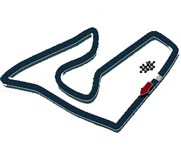| |
|
|
Jum'at - 2/3
Latihan Bebas 1
Latihan Bebas 2 |
Sabtu - 3/3
Latihan Bebas 1
Latihan Bebas 2
Kualifikasi |
Minggu - 4/3
Pemanasan
Balapan |
Informasi Sirkuit:
| Round Number: |
1 |
|
| Tanggal Balapan: |
04-03-2001 |
|
| Negara: |
Australia |
|
| Kota: |
Melbourne
(click for location
map) |
|
| Nama Sirkuit: |
Melbourne |
|
| Panjang Sirkuit: |
5.303 m. |
|
| Jumlah Laps: |
58 |
|
| Jarak Tempuh: |
307.574 m |
|
| Pole Position 2000: |
Mika Häkkinen |
|
| Juara 2000: |
Michael Schumacher |
|
| Lap tercepat 2000: |
Michael Schumacher |
|

|
BALAP KELILING DANAU |
|
Menggulir
F1 sejak 1996, sirkuit Albert Park, Melbourne
sudah disukai. karakter jalan raya modern,
membuatnya tidak jauh berbeda dengan permanen.
Sebelumnya,
GP Australia juga dilaksanakan di trek jalan
raya Adelaide. Pada 1995, fanatikan F1 Australia
terhenyak saat Adelaide kehilangan haknya
menghajat jet darat. Namun ternyata ada udang di
balik batu.
Konglomerat
asal Merlbourne Ron Walker belakangan diketahui
punya rencana besar. Dengan modal kuatnya, ia
menyulap jalan kota di sekeliling danau Albert
Park jadi sebuah sirkuit modern. "Ruang
membangun fasilitas, lebih mudah. Karena daerah
sekitar danau relatif kosong", jelas
Walker.
Hasilnya,
meski bersifat temporary (sementara),
tampilan sirkuit benar-benar persis permanen.
Bukan cuma gedung pendukung seperti tower dan pit
building berdiri kokoh, di tiap tikungan pun
terhampar gravel bed. Fakta menunjukkan,
sampai sekarang belum ada satu pun pembalap F1
cedera saat bertarung di sana.
Karakternya
bisa dibilang medium speed. Sebagian
besar tikungan berkesulitan sedang, dengan 4
tikungan mirip S (kanan langsung ke kiri).
Karena
cuaca Australia terbalik dengan negara-negara di
belahan utara seperti eropa, Albert Park selalu
jadi seri pembuka. Pasalnya awal tahun, selalu
musim panas.

|
|
 Circuit
Description, History, Facts and Figures Circuit
Description, History, Facts and Figures
|
|
Officially, there have only been twelve
Australian Grands Prix counting towards the
world championship, dating back to 1985 in
Adelaide. However, a race bearing that title was
held as far back as 1928 at Philip Island, just
outside Melbourne. It was won by Captain Arthur
Waite at the wheel of an Austin 7.
The first time a grand prix was held in Albert
Park was 1953, which makes one wonder why the
environmentalists made such a fuss about the
event when it returned here in 1996. 40 cars
were entered to tackle 64 laps of a five
kilometre track.
1956 saw the Olympic Games come to Montreal and
a grand prix to Albert Park. Stirling Moss was
the winner, beating local boy Jack Brabham
amongst others.
The first Australian race to be officially part
of the world championship was run on the
Adelaide city centre street circuit as the final
race of the 1985 championship. Keke Rosberg, now
Mika Hakkinen's manager, took his last grand
prix win here for Williams. Ayrton Senna started
from pole in a Lotus. He was the quickest
qualifier on six of his nine attempts at the
event.
Adelaide hosted the 500th GP in the history of
the sport in 1990. It was won by Nelson Piquet
in a Benetton, who just managed to hold off
Nigel Mansell's Ferrari in a thrilling finish.
The following year, the Australian race once
again earned a place in the record books; this
time for the shortest ever GP. The race had to
be abandoned after just 14 laps, because of a
heavy rain.
Sir Jack Brabham is without doubt the most
famous Australian F1 racer. He won back to back
world championships in 1959 and 1969 and in 1966
he made history as the first man to win the
title driving a car which bore his own name; in
this case the Repco Brabham. Tim Schenken, now
head of the Confederation of Australian
Motorsport raced F1 in the Seventies scoring
points three times from 33 starts. Alan Jones
brought the title back to Australia, winning the
championship in 1980 for Williams. He won a
total of 12 grands prix during his career.
McLaren has been the most successful team in the
15 Australian Grands Prix held to date, with
seven wins. Williams has five, Ferrari two and
Benetton one. Of the drivers, Alain Prost,
Gerhard Berger, Ayrton Senna and Damon Hill have
both won it twice.
|
|
| |
|

|
|
Sirkuit - 2001 |
|
| |




















